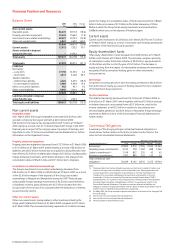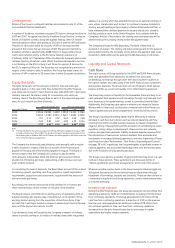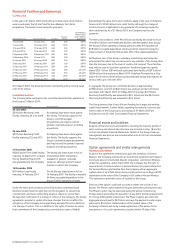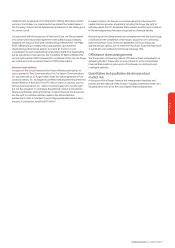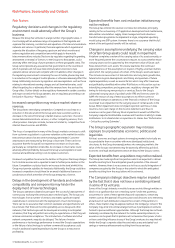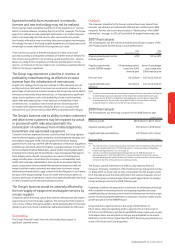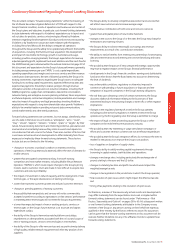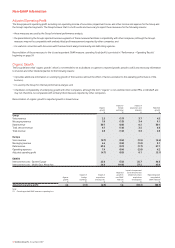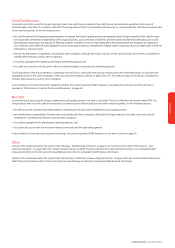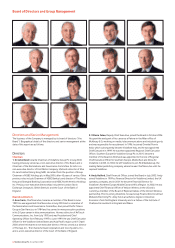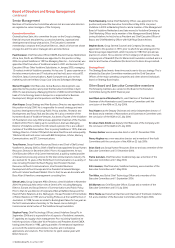Vodafone 2007 Annual Report Download - page 63
Download and view the complete annual report
Please find page 63 of the 2007 Vodafone annual report below. You can navigate through the pages in the report by either clicking on the pages listed below, or by using the keyword search tool below to find specific information within the annual report.
Vodafone Group Plc Annual Report 2007 61
PerformancePerformance
Cautionary Statement Regarding Forward-Looking Statements
This document contains “forward-looking statements” within the meaning of
the US Private Securities Litigation Reform Act of 1995 with respect to the
Group’s financial condition, results of operations and businesses and certain of
the Group’s plans and objectives. In particular, such forward-looking statements
include statements with respect to Vodafone’s expectations as to launch and
roll out dates for products, services or technologies offered by Vodafone;
intentions regarding the development of products and services introduced by
Vodafone or by Vodafone in conjunction with initiatives with third parties,
including Yahoo! and Microsoft; the ability to integrate all operations
throughout the Group and the ability to be operationally efficient; the benefits
of acquisitions, including the Hutchison Essar acquisition; the development
and impact of new mobile technology; growth in customers and usage,
including growth in emerging markets; the Group’s expectations for revenue,
adjusted operating profit, capitalised fixed asset additions and free cash flow for
the 2008 financial year contained within the outlook statement on page 59 of
this document, and expectations for the Group’s future performance generally,
including average revenue per user (“ARPU”), costs, capital expenditures,
operating expenditures and margins and non-voice services and their revenue
contribution; share purchases; the rate of dividend growth by the Group or its
existing investments; expectations regarding the Group’s access to adequate
funding for its working capital requirements; expected effective tax rates and
expected tax payments; the ability to realise synergies through revenue
stimulation activities in Europe and cost reduction initiatives, including the IT
AD&M programme, supply chain centralisation, data centre consolidation,
network sharing and enterprise resource planning initiatives; future acquisitions
and future disposals; contractual obligations; mobile penetration and coverage
rates; the impact of regulatory and legal proceedings involving Vodafone;
expectations with respect to long-term shareholder value growth; Vodafone’s
ability to be a market leader in providing voice and data communications;
overall market trends and other trend projections.
Forward-looking statements are sometimes, but not always, identified by their
use of a date in the future or such words as “anticipates”, “aims”, “could”,
“may”, “should”, “expects”, “believes”, “intends”, “plans” or “targets”. By their
nature, forward-looking statements are inherently predictive, speculative and
involve risk and uncertainty because they relate to events and depend on
circumstances that will occur in the future. There are a number of factors that
could cause actual results and developments to differ materially from those
expressed or implied by these forward-looking statements. These factors
include, but are not limited to, the following:
•changes in economic or political conditions in markets served by
operations of the Group that would adversely affect the level of demand for
mobile services;
•greater than anticipated competitive activity, from both existing
competitors and new market entrants, including Mobile Virtual Network
Operators (“MVNOs”), which could require changes to the Group’s pricing
models, lead to customer churn and make it more difficult to acquire new
customers and reduce profitability;
•the impact of investment in network capacity and the deployment of new
technologies, or the rapid obsolescence of existing technology;
•slower than expected customer growth and reduced customer retention;
•changes in spending patterns of existing customers;
•the possibility that new products and services will not be commercially
accepted or perform according to expectations or that vendors’ performance
in marketing these technologies will not meet the Group’s requirements;
•a lower than expected impact of new or existing products, services or
technologies on the Group’s future revenue, cost structure and capital
expenditure outlays;
•the ability of the Group to harmonise mobile platforms and delays,
impediments or other problems associated with the roll out and scope of
new or existing products, services or technologies in new markets;
•the ability of the Group to offer new services and secure the timely delivery
of high quality, reliable network equipment and other key products from
suppliers;
•the Group’s ability to develop competitive data content and services that
will attract new customers and increase average usage;
•future revenue contributions of both voice and non-voice services;
•greater than anticipated prices of new mobile handsets;
•changes in the costs to the Group of or the rates the Group may charge for
terminations and roaming minutes;
•the Group’s ability to achieve meaningful cost savings and revenue
improvements as a result of its cost reduction initiatives;
•the ability to realise benefits from entering into partnerships for developing
data and internet services and entering into service franchising and brand
licensing;
•the possibility that the pursuit of new, unexpected strategic opportunities
may have a negative impact on the Group’s financial performance;
•developments in the Group’s financial condition, earnings and distributable
funds and other factors that the Board takes into account in determining
the level of dividends;
•any unfavourable conditions, regulatory or otherwise, imposed in
connection with pending or future acquisitions or disposals and the
integration of acquired companies in the Group’s existing obligations;
•the risk that, upon obtaining control of certain investments, the Group
discovers additional information relating to the businesses of that
investment leading to restructuring charges or write-offs or other negative
implications;
•changes in the regulatory framework in which the Group operates,
including possible action by regulators in markets in which the Group
operates or by the EU regulating rates the Group is permitted to charge;
•the impact of legal or other proceedings against the Group or other
companies in the mobile telecommunications industry;
•the possibility that new marketing or usage stimulation campaigns or
efforts and customer retention schemes are not an effective expenditure;
•the possibility that the Group’s integration efforts do not reduce the time to
market for new products or improve the Group’s cost position;
•loss of suppliers or disruption of supply chains;
•the Group’s ability to satisfy working capital requirements through
borrowing in capital markets, bank facilities and operations;
•changes in exchange rates, including particularly the exchange rate of
pounds sterling to the euro and the US dollar;
•changes in statutory tax rates and profit mix which would impact the
weighted average tax rate;
•changes in tax legislation in the jurisdictions in which the Group operates;
•final resolution of open issues which might impact the effective tax rate;
and
•timing of tax payments relating to the resolution of open issues.
Furthermore, a review of the reasons why actual results and developments
may differ materially from the expectations disclosed or implied within
forward-looking statements can be found under “Performance – Risk
Factors, Seasonality and Outlook” on pages 58 to 60. All subsequent written
or oral forward-looking statements attributable to the Company or any
member of the Group or any persons acting on their behalf are expressly
qualified in their entirety by the factors referred to above. No assurances
can be given that the forward-looking statements in this document will be
realised. Neither Vodafone nor any of its affiliates intends to update these
forward-looking statements.



